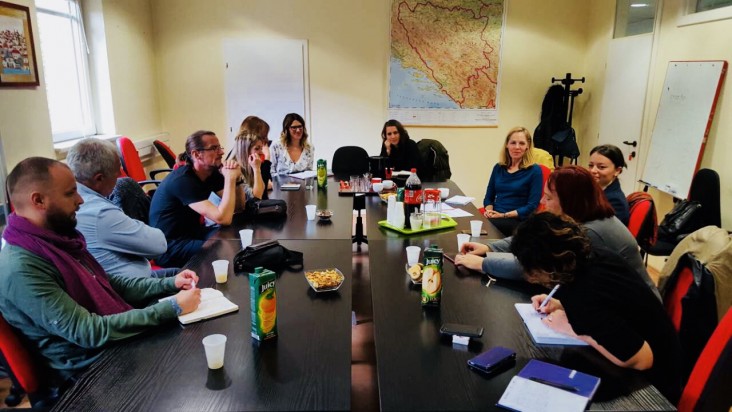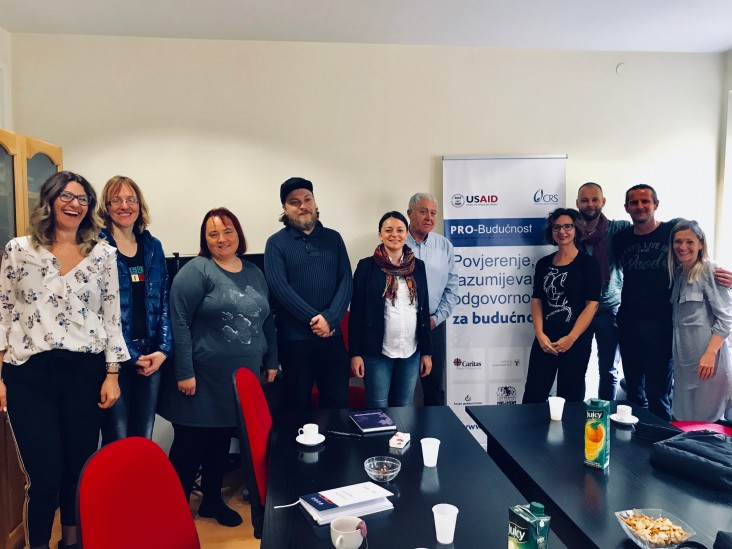Speeches Shim

By Gretchen Birkle, Deputy Assistant Administrator, USAID Europe and Eurasia Bureau
“There are religious servants who promote reconciliation, but they are lonely in their efforts; they should be linked to each other,” Amra, a young peace activist told me during a recent conversation in Sarajevo. We were talking about the impact of the war in Bosnia and Herzegovina (BiH) on the younger generation, and the role the faith-based community plays in bridging divides among the population.
Amra’s experience is a reminder that while the Dayton Peace Accords ended the conflict that defined her parents’ generation, true reconciliation among the various ethnic and religious groups will be driven by young people like her.
During my trip to BiH last fall, I had the privilege of meeting with a diverse group of students, professors, war victims and peace activists, including Amra, to discuss the intersection of religion and politics and its effect on the country’s development. We gathered at the offices of Catholic Relief Services (CRS). CRS is a partner in USAID’s PRO-Future project, a multi-year effort that works across the political and religious divide – and importantly, with young people from each faith tradition – to build a new political culture in Bosnia and Herzegovina.

Despite our many different backgrounds, our group was united in our goal of exploring how to help the next generation learn from the mistakes of the past.
The October 7 national elections provided fodder for our discussion. The country had once again handed power to the major ethno-nationalist parties -- inspiring debate among our group as to whether politicians misuse religion to build legitimacy, especially at the national level.
Officially, BiH is a secular country, yet in practice, religion features prominently in political life. Examining the roles of both institutions is one reason Zlatiborka, a university professor, says PRO-Future is a ‘treasure.’ Bringing stakeholders together at the local level from religion and politics, she said, is most important for making a difference in the lives of ordinary citizens.
A recent survey in BiH shows that 75 percent of the population believes religious communities hold great or important influence in the country. So, while the role of religious leaders may differ from political leaders, there is no question that they have tremendous potential to mobilize and connect with citizens, regardless of their ethnicity, religion or experiences from the war.
USAID’s PRO-Future program helps religious leaders leverage this influence in their efforts to keep peace. The program promotes visible public engagement among religious leaders and enables them to lead both national and community-level reconciliation activities.

Last April, for example, the heads of all four religious communities in BiH and the Inter-Religious Council jointly visited sites where mass killings of Bosniak, Serb, Croat and Jewish citizens occurred during the 1990s war and the Second World War. Through this act of paying respect, they sent a powerful message to citizens nationwide about the need to recognize all victims, regardless of their religious beliefs, their national belonging or their ethnicity.
Similar reconciliation activities continue to take place throughout BiH through PRO-Future’s Platform for Peace initiative, a declaration recently adopted by Parliament, which promotes peace-building and reconciliation processes among different ethnic and religious communities.
PRO-Future also brings together former war prisoners of different faiths to share their experiences and impart to young and old alike the importance of reconciliation. During our conversation, Kresimir and Jankica, two prisoners from different sides of the same war, sat side-by-side -- a gesture, maybe, of their commitment to teaching the next generation about one’s capacity to forgive.
Kresimir, raised in Mostar, spent several days in captivity during the war. Eventually, after the fighting stopped, he found his way home, but he understood just how lucky he was to take those first steps of freedom, as he says, "by [seeing] the end of his life." Upon entering his house, he saw a cross bearing his name and discovered that he had been presumed dead.
Jankica was raised in Sarajevo. When the conflict started he was arrested and taken to a war camp in Tarcin with his Serbian neighbors. He says that he is lucky to have spent ‘only 30 days’ in the camp, although he is quick to point out that even one minute in the prison was enough to cause a lifetime of painful memories.
These days, Jankica and Kresimir meet regularly with high schoolers to tell their stories. They hope that through sharing their suffering and by embodying reconciliation and forgiveness, the next generation will see that different ethnic groups can once again live together under a united country of Bosnia and Herzegovina.
“I [no longer] want to listen to the people who have the extreme attitudes,” Kresimir told me. “I got the chance for new life, and I am using it.”
USAID’s PRO-Future project is implemented in 70 municipalities in BiH by Catholic Relief Services in partnership with the Institute for Youth Development KULT, Caritas, Forum of Tuzla Citizens, Banja Luka Helsinki Citizen Assembly, Nansen Dialogue Center Mostar, and the BiH Interreligious Council.
See other PRO-Future success stories and program updates, including Platform for Peace: From Local Grassroots to a Cross-Border and Regional Impact and the ‘Lično (Personal) Exhibit: Portraits of War Victims’.

Comment
Make a general inquiry or suggest an improvement.